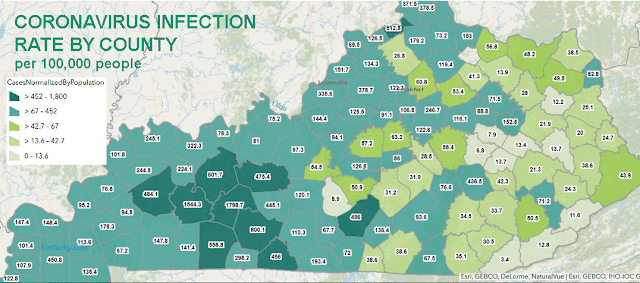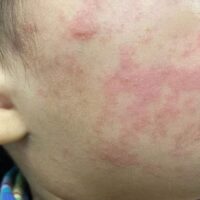The number of new, daily coronavirus cases in Kentucky continues to creep up, hitting a seven-day high of 295 on Thursday.

Beshear called the number “pretty high … elevated from where we were going for more than a week,” but said it is “a little too early” to say the trend has reversed and is on an upward trajectory.
“Again, it’s not enough data to say that I am concerned or to raise a high level of concern,” he said, pointing to other metrics: “We have a lot of tests that are out there. We are testing more asymptomatic people than ever. Our ICU current beds are really low.”
Kentucky briefly celebrated a two-week downward trajectory in new cases just last week, but starting May 28 the number jumped to 283, and for five of the last seven days the case numbers have been over 213.
Of the 295 new cases, most of them, 149, were in Jefferson County. No one asked Beshear or Health Commissioner Steve Stack about that, and neither of them offered any comment on the unusual figure. Other leading counties were Kenton and Warren, 14 each; Boone, 13; and Clark, nine.
Beshear reported an adjusted total of 10,705 cases in the state, with at least 3,303 of them having recovered. He said 518 people are hospitalized with covid-19, including 67 in intensive care. So far, the state has had 262,714 tests.
Beshear said Kentuckians should expect to see more positive tests as the state continues to ramp up its testing and as people’s contacts begin to increase with the economy reopening.
“Now, I hope that they are lower than this, but we’re going to have more,” he said. “We’re going to watch the numbers as we continue.”
Stack noted that the state’s testing capacity is well above the federal guidance to test 2 percent of the population each month.
He said another way to reach this guideline is to test until the number of people testing positive for the virus is less than 3%, which indicates that enough people are being tested to find the positive cases. Kentucky is currently at 4.07%, reports the Lexington Herald-Leader.
While the state has more than enough testing capacity, Beshear said he remains worried about “testing fatigue,” noting that the sign-ups in the free Kroger-sponsored sites have been slowing. He called on employers to get their employees tested regularly.
“If you are running a business, you ought to want your employees to continue to go to get tested so that someone who is asymptomatic doesn’t spread it throughout the office or the factory or the environment that they work in,” he said. An estimated one-fourth to one-half of the people with the virus have no symptoms but still spread it without knowing.
Deaths and classifications
Beshear announced that eight more Kentuckians have died of covid-19, bringing the state’s death toll to 458.
The new dead were an 87-year-old woman from Boone County, a 72-year-old man from Franklin County, an 82-year-old man from Grayson County, a 92-year-old man from Kenton County, a 71-year old woman and 91- and 92-year-old men from Jefferson County and an 86-year-old woman from Metcalfe County.
Asked it he would consider doing a separate count of people who have died from multiple issues, he said that could be counterproductive.
“Almost everyone that has died from the coronavirus has underlying health conditions and many of them are serious and significant health conditions,” he said. “I don’t want to over-complicate in our numbers what this virus does. Yes, there are other causes, but without this virus in most cases, we do not believe that the death would be there.
“And there may be some that say, ‘Oh, well, that’s conflating it.’ No, this is killing people and if we don’t take it seriously, again if we pull out our numbers in different ways that let us rationalize that it is not a problem, then we don’t do what is necessary to defeat it.”
Politics
Asked about Attorney General Daniel Cameron’s suggestion to a legislative panel that the governor’s executive authority during such emergencies should be limited, Beshear referred to his presentation the day before defending his orders and noting three studies showing they “saved thousands of lives.”
“It’s after we’ve blunted the curve and crushed the curve that politics comes back into it,” he said. “But, if a future governor did not have the power to take urgent action when it is needed, it would have resulted in significant additional death. … Every action that I’ve taken is for the life and the safety of our Kentuckians.”
Schools
Asked about schools reopening, Beshear said he hopes there will be a regular reopening, but cautioned that school will look much different than it currently does.
He pointed to recent testimony at a legislative hearing that objected to public-health suggestions for social distancing, wearing masks and keeping one group of students together all day, while teachers move from class to class.
“If schools don’t do things differently, they have an outbreak, you shut down that school,” Beshear said. “I think we’ve seen that in France and in some other places. My hope is that we can start school normally in the fall, but those schools that are willing to embrace the things you need to do to prevent the spread are likely going to be able to continue and not have interruption.”
He said state officials are still working on guidance for schools and this will be influenced by what happens with the virus over the next few months.
Disparities
Beshear said he would announce actions that his administration will take to address disparities in health care and other areas among “communities of color.” on Monday. North Carolina Gov. Ray Cooper signed an executive order Friday establishing a task force to address the issue, ensure that relief funds have been fairly distributed and giving minority-owned businesses access to more opportunities and resources. Beshear said he wants to change the situation, not just come up with recommendations.
For additional information, including up-to-date lists of positive cases and deaths, as well as breakdowns of coronavirus infections by county, race and ethnicity, click here.
In other COVID-19 news Thursday:
- “Less than a year after Kentucky celebrated its first decline in overdose deaths in five years, evidence is building that the covid-19 pandemic and its fallout have fueled a rise in drug relapses and fatal and nonfatal overdoses in parts of Kentucky,” Chris Kenning reports for the Louisville Courier Journal.
- The long-term-care facility webpage has been updated to an easier-to-read format. It shows that 1,384 residents and 639 staff have ever tested positive for the virus, with 411 residents and 141 staff currently with it; 283 residents and two staff have died of covid-19.
- Six Eastern Kentucky counties are among the 25 U.S. counties with the highest overall food-insecurity rates, and the covid-19 pandemic is making it worse, Liz Moomey reports for the Lexington Herald-Leader. Michael Halligan, the chief executive officer of God’s Pantry Food Bank, told her that the region had never quite bounced back from the 2008 financial crisis. She writes that many food banks are just beginning to reopen.
- Beshear announced that Nascar would be allowed to race at the Kentucky Speedway July 9-12 without fans and more information on this would be coming Monday. He said betting parlors for “historic horse racing” can open Monday, June 8, at 33% capacity.
- Also opening Monday are in-home childcare, libraries, horse shows, and educational and cultural activities. The Kentucky Horse Park and state park campgrounds can open June 11.
Melissa Patrick is a reporter for Kentucky Health News, an independent news service of the Institute for Rural Journalism and Community Issues, based in the School of Journalism and Media at the University of Kentucky, with support from the Foundation for a Healthy Kentucky. She has received several competitive fellowships, including the 2016-17 Nursing and Health Care Workforce Media Fellow of the Center for Health, Media & Policy, which allowed her to focus on and write about nursing workforce issues in Kentucky; and the year-long Association of Health Care Journalists 2017-18 Regional Health Journalism Program fellowship. She is a former registered nurse and holds degrees in journalism and community leadership and development from UK.






